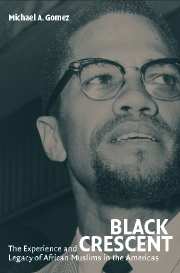7 - The Nation
Published online by Cambridge University Press: 05 June 2012
Summary
According to records internal to the organization, the Lost Found Nation of Islam in America was founded on July 4, 1930. By the time its founder launched the venture, Noble Drew Ali may have been preaching and organizing throughout much of the United States for seventeen years. Indeed, when W. D. Fard Muhammad made his appearance in the streets of Detroit, Noble Drew Ali was already dead, having established Moorish Science as a comprehensive, mature theological articulation. There remains sharp disagreement over the precise nature of the relationship between Moorish Science and Fard Muhammad, if in fact any existed. These disagreements are important as they go to questions of authenticity and claims of divine inspiration, but rather than attempt their resolution, it would be more profitable to simply echo an observation shared by all: Fard Muhammad was a principal beneficiary of a theoretical framework and quality of discourse created by Noble Drew Ali. He was very much aware of the former's influence and stature, so much so that his early message was tailored for ears accustomed to Moorish Science doctrine. To acknowledge as much in no way diminishes Fard Muhammad and his most distinguished disciple, Elijah Muhammad, as originators in their own right and as sources of sacred sentiment.
However, the Nation of Islam would go far beyond the limits of Moorish Science. Indeed, it can be argued that the latter's ideological parameters have essentially remained unchanged, consistent with the initial vision of its founder.
- Type
- Chapter
- Information
- Black CrescentThe Experience and Legacy of African Muslims in the Americas, pp. 276 - 330Publisher: Cambridge University PressPrint publication year: 2005



